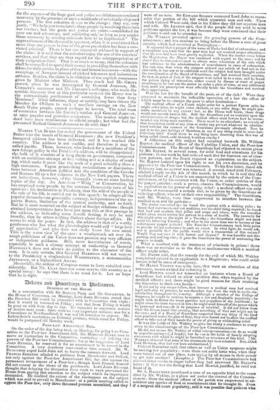Maims: VAN BUR.EN has ceded the government of the United
States into the hands of General HARRISON: the new President's inaugural address has been delivered, and it has reached this country. The address is not warlike, and therefore it may be called pacific. Those, however, who looked for a manifesto of the new foreign policy in the President's address, will be disappointed : the bulk of it consists of a long thesis on government, composed with an ambitious attempt at fine writing and at a display of read- ing, which make it more like the work of a good schoolboy than a high statesman. Vague generalizing assimilations or discrimina- tions between American politics and the condition of the Greeks and Romans fill up a few columns in the New York papers. There are indications, however, of the General's views on some leading topics of the day. An American " Whig" or Conservative, he has surprised some people by the extreme Democratic turn of his opinions: his declaration at Pittsburg, that the will of the people is the rule of his life, is carried out in this speech : he adopts all the popular demands—an munetallic currency, independence of the se- parate States, limitation of the central authority, and so forth. But he is snore reserved on the subject of foreign relations : though strained interpretations have been put upon this or that passage in the address, as indicating some hostile feeling, it may be said broadly, that he utters nothing distinct about foreign affairs. He seems to wish for peace. In fact, the address is that of a worthy gentleman who has what the phrenologists would call "large love of approbation," and who does not really know his own mind. This is the worst view-sof the case : a weathercock set over the rough politicians of the Union does not promise any very efficient or independent guidance. Still, mere incontinence of words, especially in such a clumsy attempt at authorship as General Hammon's, does not always do justice to the character of the man. It is only certain, that General HARRISON will not restore to the Presidency a singleminded WASHINGTON, a statesmanlike JEFFERSON, or a highspirited ADAMS.
Meanwhile, the ardour of Congress seems to have subsided con- siderably. But Mr. CLAY does not come over to this country as a special envoy : he says that there is no need for it. Let us hope that he is right.


























 Previous page
Previous page